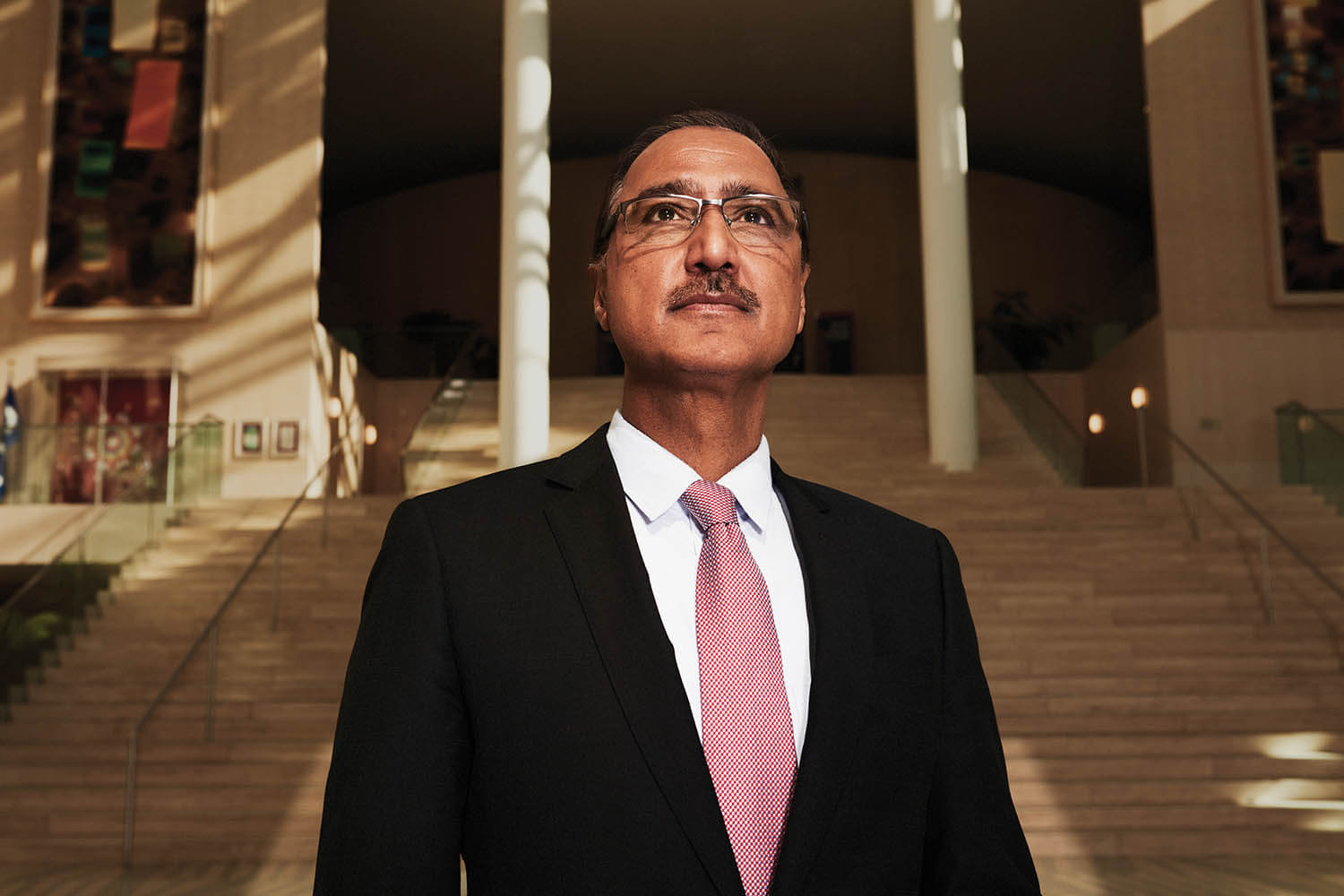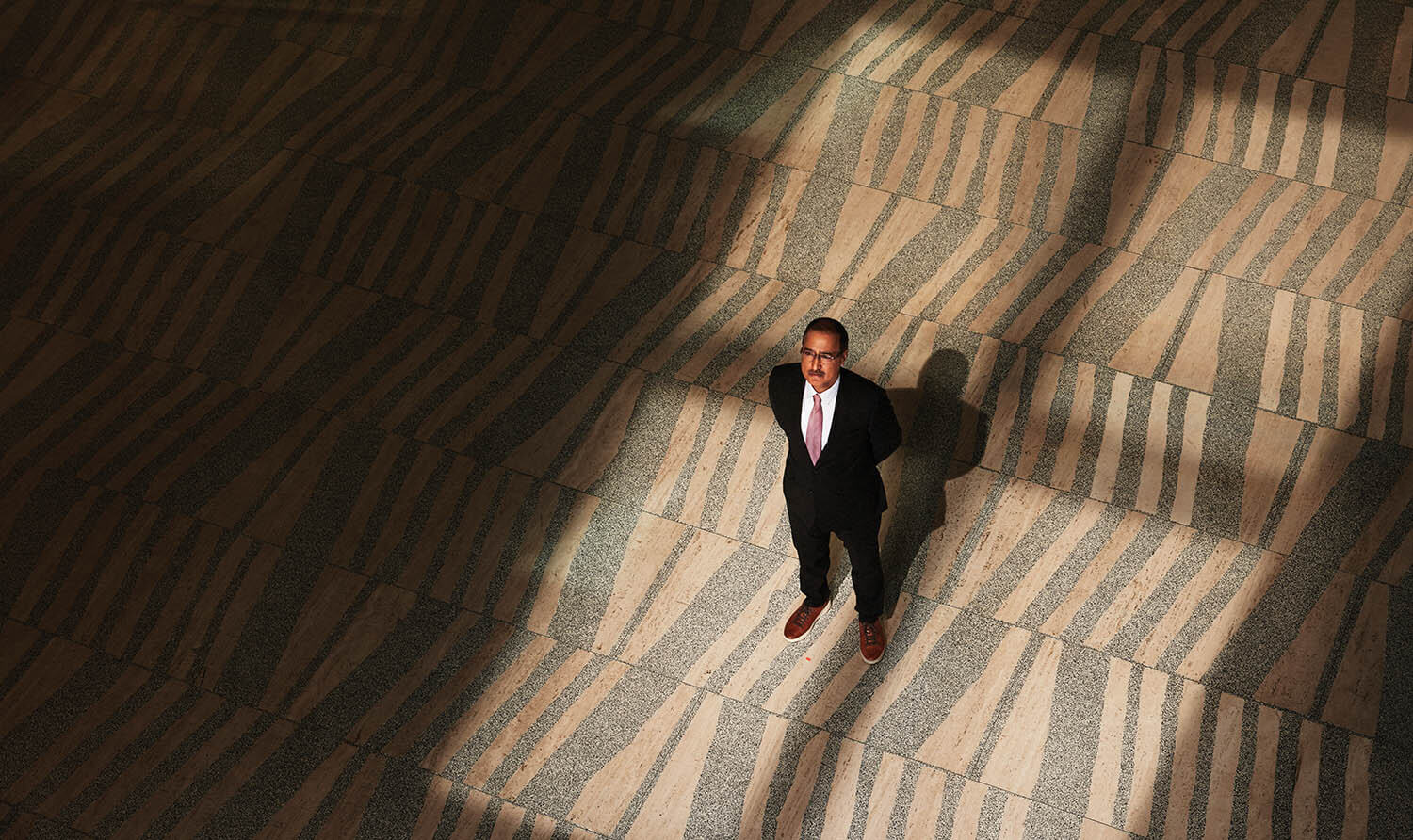
Late on a Wednesday afternoon, the second-floor nerve centre of City Hall is almost tomblike in its quietness. There’s a brief flurry of activity from staffers coming in and out of closed doors, before they announce the mayor is ready for the interview.
Down a hallway, Amarjeet Sohi sits on a sofa in his spacious office, soaking up a sunbeam. Suit jacket off and unmasked, he sips lemon water, one knee casually crossed over the other, revealing brightly patterned socks.
He stands and greets a visitor with a fist bump, the first reminder of how COVID-19 has fundamentally changed human interaction. The second is a brief discussion about whether masks will be worn for the interview — the decision is no, as the seats are a fair distance apart.
These housekeeping items seem minor, but a glance out the large window behind the sofa recalls the enormity of what the city and the world have been through.
Only a handful of people are gathered in the City Hall plaza, despite the pleasant day. Empty parking spots abound. Two years into the pandemic, only ghosts remain of the crowds of office workers who used to traverse the square.
“The way our downtown is, I feel my heart breaks when I go out there. My heart breaks to see the pain out there, people struggling to make ends meet, and people sleeping on the street… and that sense of helplessness. I’m saddened by that,” Sohi says. “That’s why I think we need to figure out a way, we need to do whatever we can to bring more people back into our downtown.”
At the time of the interview, five months have elapsed since Sohi was elected mayor of Edmonton, with 45 per cent of the vote. Sohi defies comparisons to his predecessor, two-term mayor Don Iveson, noting he comes to the role from a unique background and “humble, working-class” beginnings.
Sohi immigrated to Edmonton from India at age 18. On a return trip to India in 1988 he was imprisoned for nearly two years on trumped-up charges that were later thrown out. In Edmonton, he worked as a city bus driver before being elected to city council, and later as a Member of Parliament and cabinet minister in Prime Minister Justin Trudeau’s Liberal government.

Now 58, and a married father of one, Sohi says his life’s path has informed his vision to build a city that “lifts everyone up” in “an Edmonton for all.”
“If I’m passionate about equity and fairness and justice, it’s because I have felt the sting of discrimination and racism and being treated unfairly. If I’m passionate about public transit, about libraries, about recreational facilities, green spaces — all those things touched my life.”
He lists his top priorities: Downtown recovery, solving homelessness, energy transition and climate change, economic growth and the city’s anti-racism strategy.
“Downtowns are critical for urban economic success,” he says, estimating Edmonton’s downtown generates 11 per cent of its tax base.
“A visitor staying at a hotel downtown, stepping out and running into disorder is going to think twice [about investing in our city],” he says. “We continue to face challenges related to houselessness, mental health and addictions — public health issues [that)] are the responsibilities of the provincial and federal governments, and somewhat shared by cities,” he says.
“We are not an island on our own. Without partnership to tackle societal issues, we’re going to suffer economically. A lot of what we want to do depends on a stronger partnership with the provincial government, the federal government and the regional partners… absolutely stronger than what it is now.”
Municipalities have been forced to navigate a complex relationship with the UCP government, which has cut their infrastructure funding by 25 per cent over the next three years. Sohi called the recent provincial budget “a slap in the face for Edmonton” — tough talk for a man who describes himself as soft spoken. Sohi’s $39 million budget ask for supportive housing, and another $25 million to support those living in it, was fully refused. The Alberta government did fund Sohi’s ask of $5 million for downtown revitalization efforts.
Sohi describes Edmonton’s current relationship with the province using careful words. “I would say the relationship… is there,” he says. “It’s not broken.”
Maybe just bent out of shape.
Weeks after Edmonton’s budget disappointment, Sohi said city council was “treated like kids” when the “Municipalities should be treated as an equal order of government. I think the realization has to happen that any province would not be successful without the success of the urban centres. Cities are the driver of the economy these days. Cities are the centre of activity from health care to social services to education, to arts and culture to tourism. Without all that, your province’s economy is not going to grow,” he says.
Sohi is optimistic about opportunities ahead. He says there has been a “rekindling” of relations with the province since the budget and progress on some joint files. But he’s frank about the cost challenges of addressing complex issues such as homelessness. Apart from property taxes, cities have limited ability to generate revenue. He’s non-committal about requesting provincial approval for new revenue-generating powers.
“This is a struggle I don’t know the solutions to yet. It’s my responsibility to continue to find ways to work with the provincial government, to move the needle on these issues and convince them that investing in these issues is not only good for people, but it’s also good for the economy, it’s also good for the long-term financial sustainability of the province’s own finances.”
The relationship with the province isn’t the only relationship Sohi has to manage as mayor. There are 12 even closer — some might say even more crucial — relationships to nurture here in his own workplace with city councillors, many of whom are brand new and still learning the ropes.
The mayor is just one vote on council. A challenging aspect of mayoral leadership is building the consensus required to turn his vision for the city into action. Add to that city administration, the business community and non-profit agencies, and it makes many relationships to manage.
That’s what makes being a mayor different from being an MP or a councillor, Sohi says.
“The importance of relationship is much more necessary and required as a mayor than it was as a member of parliament or even as a councillor. To be effective as mayor, relationships are key — maintaining, strengthening, building and sustaining those relationships.”
A critical relationship that continues to evolve is the one between the community, police and social agencies. In the wake of the 2020 murder of George Floyd at the hands of Minneapolis police, Edmonton initiated very public policy discussions about systemic racism in policing, and about decreasing interactions between law enforcement and vulnerable and racialized populations.
Sohi and the new council have taken up the work with an anti-racism strategy.
“Anti-racism was my first motion that we passed. Now we are developing a strategy and implementing [it],” Sohi says.
Sohi talks about the need for police to be accountable given the immense power they wield. In December, council voted 8-5 in favour of rejecting the Edmonton Police Service’s request for an $11 million budget increase. Sohi voted for the rejection. But, in May, the province put pressure on council to examine its law-enforcement strategy, in the wake of rising crime numbers downtown.
In June, council voted to hold the line on the police budget. allocating a baseline figure of $407 million for 2023.
Police chief Dale McFee has since appointed new advisory councils in an effort to improve community relations.
Sohi says he was “pleased” to see McFee do that, but adds the city also needs to support social services and agencies so the community can rely less on the police to tackle social issues.
“Police (are) probably not the best in responding to someone who is dealing with a mental health issue that could better be handled by a social worker,” he says. “That’s where more work needs to be done.”
This council’s approach to community safety is a “comprehensive” one, he says.
“It not only sees the necessity of policing but also the necessity of investing in social programs, prevention, intervention and community support. I think agencies and the police service and city council need to work together on those.”
Given the breadth of work before him, Sohi predicts his biggest challenge over the next four years will be to stay focused on his priorities in the face of distractions.
“My focus is Edmonton and my focus is Edmontonians, and I think when Edmonton is successful, our region is successful.”
The question, as the term of this new mayor progresses, is how the view out his window will change.
This article appears in the Summer 2022 issue of Edify








